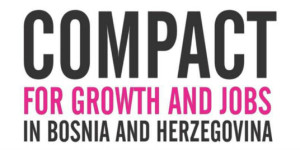The European Union-led donor conference in Brussels on 16 July agreed a multi-million Euro aid package for citizens of Serbia and of Bosnia and Herzegovina who have been affected by the catastrophic flooding in May. The initial influx of funds will go directly to helping people repair and rebuild their homes before the onset of winter.
The EU’s response to the disaster in the Western Balkans has been practical and quick. The aim is to get the right help to the right people with the least possible delay.
A week after the Brussels aid package was announced, the EU unveiled another economic initiative, this time one that has been in development since the beginning of the year. Although it is not directly related to the flood recovery effort it will have a positive impact on it and – if it is implemented – will have a positive impact on Bosnia and Herzegovina as a whole. The reality is that in these circumstances money must not and cannot be wasted.
Following a period of intensive consultation with political and government representatives, NGOs, trade unions, employers, economic experts, the International Financial Institutions and representatives of a large number of partner countries, the European Union unveiled a “Compact for Growth and Jobs” on 24 July. The Compact is designed to tackle key problems that are preventing Bosnia and Herzegovina from achieving sustained and substantial economic growth. It outlines the following proposals:
1. High taxes on wages are driving people into the grey economy and undermining the social unity that is necessary to pay for social services. The grey economy does not generate revenue (pay taxes) but people employed in it enjoy services (i.e., health care) that are paid with taxpayer money. Therefore, taxes on working need to be cut, and this will require savings on government spending.
2. Laws that protect workers with jobs are making it impossible to hire people without jobs. Too much regulation is preventing young people from getting access to employment. Therefore, labour laws and regulations need to be reformed.
3. BiH has one of the most complicated business environments in the world and it is steadily getting worse. As a result, there is virtually no investment, neither domestic nor foreign. The business environment needs to be simplified and red tape needs to be cut across the board (as other countries have done).
4. Many old enterprises are barely surviving and rely on help from the state (that raises taxes on others to provide them with subsidies). This is not a sensible policy for future
growth. Instead, old enterprises need to face competition, and either restructure or face the prospect of closure so that new enterprises can take their place.
5. Corruption acts as a serious barrier to investment and undermines growth and social policies. And corruption thrives on complicated regulations and fees that officials can offer to resolve or get around. There needs to be a drive to reduce regulation and to make the remaining procedures clearer to and open to the scrutiny of the public.
6. Social security needs to go to those people who really need help. Instead, many people who are not poor have privileged access to benefits and this puts an unfair burden on working people as well as on those who need help.
The Compact comes at a time when a major part of the BiH population has undergone huge suffering and trauma as a result of the recent floods, but the fact is that incoming funds to assist flood recovery also present an opportunity to do things in a new way – and to do them properly. Sensible reforms in the economy bringing more efficiency will also make flood recovery easier, and they will help the BiH economy as a whole to get back on track after years of decline. The aim of this initiative is to raise living standards in Bosnia and Herzegovina through targeted economic reforms. Whether or not it succeeds will depend very much on whether these proposals, drawn up through consultation and consensus, can be turned into government policy.




